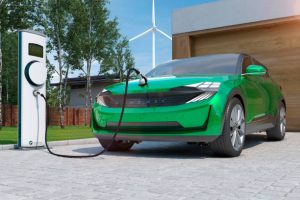Introduction
Artificial intelligence in cars is transforming the manner in which we drive as cars are getting smarter, safer, and more productive. Artificial intelligence is transforming the automotive industry, and this has been advanced through self-driving cars and advanced driver-assistance systems.
This technology does not just make driving experience better, it also reduces accidents, traffic optimization and lets cars learn on their environment. The transportation of the future is smart and self-driving.
The Rise of Smart Cars
The use of smart cars is no longer futuristic. Through AI in cars, the cars have become able to detect obstacles, forecast traffic, and communicate with other cars.
These systems assist drivers to make a good decision, use less fuel, and achieve safety. With the development of AI technology, smart cars will be even more adaptive and will be able to learn the behavior of a user and thus offer him or her a personalized driving experience.
Self Driving Technology

One of the most thrilling ways of AI application to cars is autonomous driving. Self-driving vehicles are dependent on machine learning, sensors, and cameras to drive on the roads safely. These cars are able to recognize people on the roads, read road signs and make decisions within a second. Using sophisticated software, self-driving cars have the potential to minimize human error, avoid collisions and develop a smooth driving experience.
AI-Powered Safety Features
The use of AI in cars also contributes to a high level of safety, especially because of such functions as collision avoidance, lane-keeping, and adaptive cruise control.
These smart systems observed the environment of the vehicle and informed the drivers about any possible danger, and even made correct decisions on their own. With the implementation of
AI, the car will act proactively instead of reactively and lower the risks of accidents and make all trips of drivers and other people in the car safer.
Anticipatory Maintenance and Optimization

Vehicle maintenance and optimizing performance are other areas that are changed by AI. With predictive analytics, a car is able to check the engine condition and diagnose anomalies, as well as plan the maintenance before a problem develops.
Not only does this save the time, but also money to the owners of cars. Application of AI in cars, will also guarantee that a car is running at its optimal level, which reduces fuel usage and increases the overall life of the main parts.
Individualized Driving Experiences.
Current AI systems in vehicles get to know how drivers behave and what they like after time. AI adjusts the car to individual preferences, seat preferences and routing options, among other features. Such personalization enhances comfort, convenience and satisfaction.
With the further development of AI in automobiles, cars will get even more intuitive, anticipating the needs of the driver and helping him or her even before he or she does.
Smart Cities and Connected Vehicles
AI in cars is instrumental in the creation of connected cars and smarth city ecosystem. Autopiloted cars will be able to interact with traffic lights, parking systems, and other vehicles to maximize traffic flow.
By integrating this, congestion, time consumption and environmental impact are minimized. Urban mobility will become a different experience in the future with the assistance of AI-led transportation networks.
Issues and Ethical Issues
In spite of its advantages, AI in cars is associated with such problems as data protection, cybersecurity, and ethical decision-making. Autonomous vehicles should be able to operate in tricky circumstances in a responsible manner that balances efficiency and safety.
The manufacturers and policymakers need to come together to develop laws and systems that regulate the use of AI in an ethical manner. These issues must be resolved to popularize smart and autonomous vehicles.
The Future of AI in Automobiles

The future of AI in automobiles is bright, with innovations like fully autonomous fleets, AI-powered traffic management, and predictive driving assistance.
As technology matures, cars will become safer, more efficient, and more connected than ever. The continued integration of AI will redefine mobility, making transportation smarter, greener, and more convenient for everyone on the road.
Conclusion
AI in automobiles is no longer optional; it is a driving force shaping the automotive landscape. From smart cars to autonomous driving, predictive maintenance, and personalized experiences, AI is transforming the way we travel.
Embracing these advancements will lead to safer roads, more efficient transportation, and a future where intelligent vehicles enhance every aspect of mobility.












Add Comment